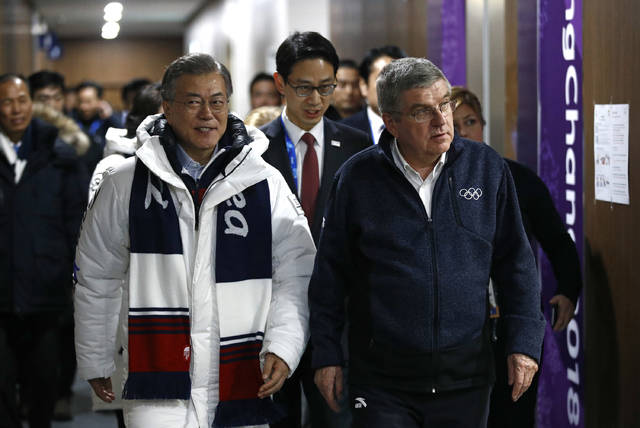South Korea’s Moon faces big decisions to keep Olympic peace

ASSOCIATED PRESS
South Korean President Moon Jae-in, left, and International Olympic Committee President Thomas Bach walked into a viewing suite at the closing ceremony of the Winter Olympics.
SEOUL, South Korea >> With a two-hour spectacle of drones and K-Pop on Sunday, South Korean President Moon Jae-in celebrated the end of a Winter Olympic Games that fostered a fragile peace with North Korea. Now, he’s got to make it last.
Even before North Korean athletes started returning across their fortified border, Moon was juggling two big questions: whether to press U.S. President Donald Trump to tone down or postpone upcoming military drills that risk to reigniting tensions, and whether to accept Kim Jong Un’s invitation to meet in the North Korean capital.
The choices lay bare Moon’s predicament. He wants to preserve an Olympic detente during which Korean athletes marched under a unified flag and Kim’s sister offered the first leadership meeting between the neighbors in 11 years. But he doesn’t want to hurt his alliance with Trump, who has vowed “maximum pressure” to make North Korea give up its nuclear weapons program and to use military force, if necessary.
Before Sunday’s closing ceremony at the Olympic Stadium, there were signs of friction. Kim sent as his envoy a ruling party official whom many South Koreans blame for sinking one of their warships in 2010, killing 46 sailors. Meanwhile, Trump imposed new sanctions to disrupt trade with North Korea and predicted a “very rough” phase if the campaign failed.
A South Korean official involved with peninsular nuclear issues said Moon was seeking a way to carry out the planned military exercises that won’t prompt a response from North Korea. Seoul hoped to persuade Pyongyang to open a direct dialogue with the U.S., which would lay the ground for a meeting between Moon and Kim, said the official, who spoke on the condition of anonymity.
The North Korean delegation abruptly canceled a meeting with Vice President Mike Pence at the start of the Olympics, the Trump administration said last week. On Sunday, South Korea’s presidential office said North Korean delegates expressed a willingness to talk with the U.S., but Ivanka Trump, the president’s daughter and representative at the ceremony, didn’t greet any VIPs from Pyongyang.
Don't miss out on what's happening!
Stay in touch with breaking news, as it happens, conveniently in your email inbox. It's FREE!
The South Korean president must make headway before the Winter Paralympic Games end March 18. The allies have said their mass military drills, which North Korea has denounced as a rehearsal for war, will begin shortly thereafter.
“If the joint drills are low-key and North Korea refrains from reacting too wildly, then it could be a good start for exploratory talks between the U.S. and North Korea to at least freeze Pyongyang’s nuclear program,” said Koh Yu-hwan, who teaches North Korean studies at Dongguk University in Seoul.
North Korean state media said Feb. 19 that the nation was “fully ready for both dialogue and war.” “The Trump group’s racket for resuming the war exercises is a wild act of ruthlessly trampling even a small sprout of peace that has been now seen on the Korean peninsula,” the Korean Central News Agency said in a separate commentary.
The U.S. and South Korea postponed the large-scale exercises from their usual early March start after Kim initiated the Olympic dialogue. The South Korean Defense Ministry said last week that they would go forward to hone plans to detect, disrupt, destroy and defend against North Korean missiles, the Yonhap News Agency reported.
Moon wants to avoid provoking another weapons test by Kim, whose regime has a pursued nuclear arsenal for decades to deter any U.S.-led invasion. Kim declared his weapons program complete after his last rocket launch Nov. 29 — an intercontinental ballistic missile that arms control experts believe could reach any U.S. city.



